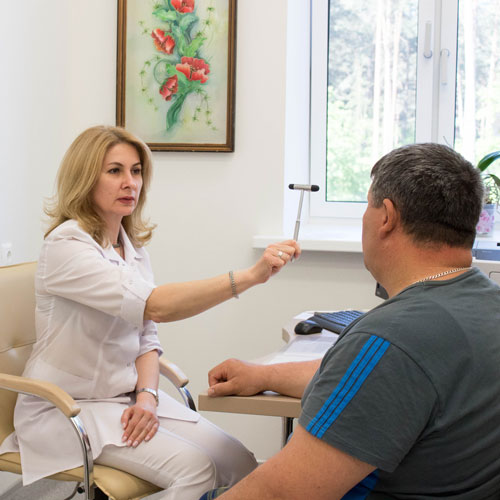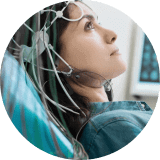
According to figures provided by WHO, millions of individuals are affected by neurological disorders. Morbidity caused by cerebral accidents numbers in over six million cases annually. 47.5 million individuals are afflicted by dementia; and every year 7.7 million new cases are registered. Global hemicrania prevalence exceeds 10% of population. Sleeping disorders account for the same percentage. Many of the above disorders can be cured or, at the least, corrected if the health problem is dealt with in a timely manner by submitting to a neurological examination and undergoing therapy.
SI “RCMC” offers the following services to patients affected by neurological disorders:
NEUROLOGICAL DISORDER DIAGNOSTICS AND TREATMENT CAPABILITIES OF THE RCMC
The Neurology Department of the RCMC provides services in the following areas:
- Cerebral accident rehabilitation
The unique suite of cerebral accident rehabilitation programs facilitates recovery of health and mental activity, and reduces the risk of recurrent cerebral accidents and other cardiovascular complications. - Treatment and rehabilitation of neurological disorders
- Treatment of back pains
- Treatment of sleeping disorders
The Sleep Office of the RCMC is outfitted with the most advanced diagnostic and therapeutic equipment of the major international manufacturers. This makes it possible to search for the cause of the patient's sleep disorders and, depending on the revealed pathology, to carry out the most effective therapy. - Treatment of dizziness and motion coordination disorders:
The Vestibular Research Office is fitted out with unique equipment which enables specialists to perform comprehensive examinations of patients affected by motion coordination disorders and walking instability. - Comprehensive nervous system disorder diagnostics and rehabilitation program for post-COVID-19 patients
Advantages of treatment and rehabilitation procedures performed at the RCMC:
- The patient's rehabilitation is managed by a multidisciplinary team of medical specialists, with the first consultation conducted on the day of admission followed by status monitoring throughout the duration of the program.
- The Rehabilitation Department employs advanced modern equipment and robotic systems that feature biofeedback.
- Round-the-clock monitoring and supervision of patients by medical specialists and nurses.
- Capability to consult the patient immediately following the discharge from the inpatient facility.
- Instruction of the patient on living regimen following a previous cerebral accident to prevent the recurrence of the disease.
- Personalized care.
- Composition of an individual menu to provide dietetic service, and development of a control observation schedule.
- Patient rooms are fitted out with novel medical equipment.




